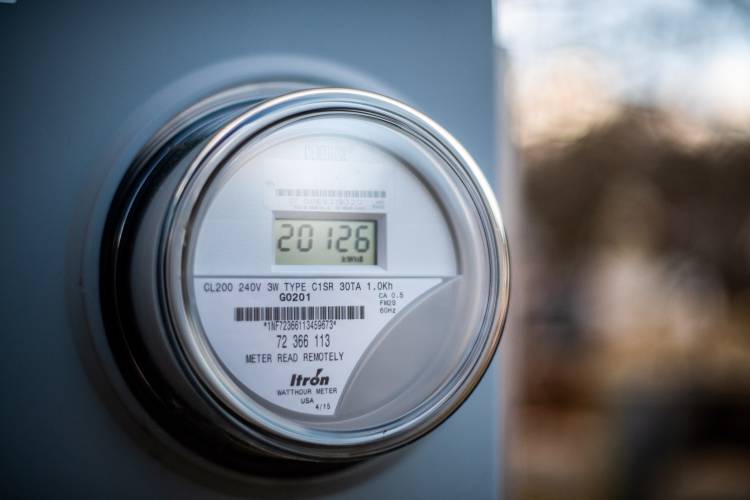Concord, several area towns agree to launch community power

The Community Power Law, RSA 53-E, allows municipalities to purchase electricity on behalf of their residents. Multiple municipalities can unite to purchasing energy at still lower costs, and participating communities can opt to increase and diversify their green energy portfolios. Staff photo by Ben Conant
|
Published: 03-14-2024 3:26 PM
Modified: 03-15-2024 12:26 PM |
Concord and several area towns are getting on the community power bandwagon.
The City Council unanimously voted Monday to adopt the program, which allows communities to participate in buying electricity rather than just getting it through the local utility. Voters in three area towns also agreed Tuesday, with two more taking it up Saturday.
Concord City Council voted 15-0 on Monday to proceed, using the non-profit Community Power Coalition of New Hampshire as their power agency. The program will probably kick off this fall.
On Tuesday, town meeting day, a number of towns throughout the state saw voters back community power. That includes Dunbarton, where it passed easily on a show of hands, and Pittsfield, which backed the idea by ballot, 291-87. Those communities will use the private company Standard Power of Nashua as their broker.
Deerfield voters also approved getting into community power, 742-575, while voters in Boscawen also approved the idea of community power through the Community Power Coalition. Voters in Loudon and Hopkinton, both of which are members of the Community Power Coalition but have not agreed to launch the service, will vote on the issue at town meeting Saturday.
It’s possible that towns could launch the service as early as June.
In discussion before the Concord City Council, one issue that came up involves net metering, when people with solar panels are paid for excess electricity sent back to the grid. Electric utilities haven’t shared the necessary data to allow net-metering customers to participate in community power, so customers with solar panels are not automatically enrolled in the Coalition’s programs.
Sixteen New Hampshire towns and cities are already participating in community power through the Coalition and dozens more are considering it or are in the process of starting. Seven other communities participate through Standard Power and more than a dozen are considering it.
Article continues after...
Yesterday's Most Read Articles
 Sudden pile of trash near Exit 13 on Manchester Street in Concord considered ‘illegal dumping’
Sudden pile of trash near Exit 13 on Manchester Street in Concord considered ‘illegal dumping’
 With Steeplegate still held up in court, city privately debates public investment
With Steeplegate still held up in court, city privately debates public investment
 Merrimack Valley schools to consider eliminating most Penacook bus routes
Merrimack Valley schools to consider eliminating most Penacook bus routes
 Blueberries, honey, flowers and more: Dunbarton gets a new farmers’ market
Blueberries, honey, flowers and more: Dunbarton gets a new farmers’ market
 OSHA investigates Pittsfield partial building collapse
OSHA investigates Pittsfield partial building collapse
 Traffic declined at Manchester Airport last year, making it the only major airport in New England that failed to grow
Traffic declined at Manchester Airport last year, making it the only major airport in New England that failed to grow
The two programs both buy power on the open market, rather than through the local regulated utility, but have a number of differences. The Coalition acts as somewhat of a power service provider for the community, negotiating prices for power usually after twice-a-year adjustment in rates from utilities. Standard Power acts as a broker, negotiating a multi-year contract at a set price.
Under state law, residents of community-power towns and cities are automatically enrolled in the program but can opt out at no cost, staying with the local utility. The utility continues to handle billing and continues charging for distribution of electricity; only the “energy charge” for actual electricity is consumed differs. The energy charge usually takes up about half of home bills.
Community power is usually cheaper than electricity from the utility, although not always, and usually provides more options for paying extra for “green” power.







 Mullet madness: Young man who died in motorcycle accident remembered at local fundraiser
Mullet madness: Young man who died in motorcycle accident remembered at local fundraiser ‘Entire paradigm has to shift’: Majority of parents express support for phone ban, but predict rocky rollout
‘Entire paradigm has to shift’: Majority of parents express support for phone ban, but predict rocky rollout New Hampshire committee seeks to prevent domestic fatalities like murder-suicide in Berlin
New Hampshire committee seeks to prevent domestic fatalities like murder-suicide in Berlin ‘A little piece of everything I like’: New Pittsfield barbershop brings more than a haircut to downtown
‘A little piece of everything I like’: New Pittsfield barbershop brings more than a haircut to downtown
